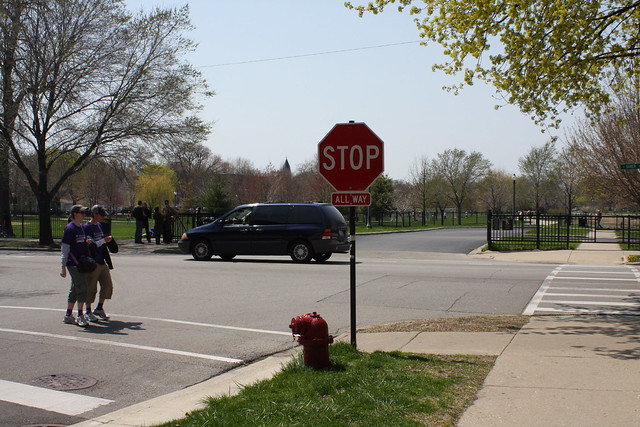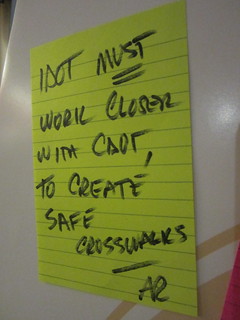
Last Thursday at the Active Transportation Alliance’s annual member meeting, director Ron Burke announced plans for next year, including campaigns for better downtown bike parking and more funding for pedestrian infrastructure and Safe Routes to School programs. The advocacy group will also continue lobbying for bike access on South Shore Line trains, and launch a new winter bike commuting challenge.
At the meeting, attended by about 75 Active Trans members, Burke began by touting the group’s 2014 achievements. The new Kids on Wheels on-bike education program brought a trailer full of loaner bikes to suburban schools, and Active Trans recently secured funding for a second trailer. The group met with Metra to negotiate the loosening of restrictions on bringing bikes on board, including the elimination of most event-related blackout days and a new policy allowing cycles on early-morning inbound trains.
The Safe Crossings campaign announced the 20 most dangerous intersections in the city and the suburbs as a way to draw attention to pedestrian safety issues. “It’s really all about educating municipalities, and the Illinois Department of Transportation, frankly, about the importance of making our streets safe places for walking and biking,” Burke said.
This year, Active Trans worked with the Center for Neighborhood Technology to launch the Transit Future campaign, advocating for a new Cook County-based revenue stream to expand public transportation. “In Metropolitan Chicago, only one out of four people can get to work by transit in under 90 minutes,” Burke noted. “Our transit system is really from a different era. It really doesn’t work for where people live and work today. It hasn’t expanded -- in fact it’s shrunk, a lot.”
Active Trans’ Family-Friendly Bikeways campaign is working to build more miles of advanced bike facilities -- such as protected lanes, bike boulevards, and off-street trails – in the suburbs. The group has been pushing for light rail or bus rapid transit to be incorporated into plans for the North Lake Shore Drive reconstruction, and is also lobbying for better separation of pedestrians and cyclists on the Lakefront Trail.
Active Trans has also helped stage Play Streets events, block parties that open neighborhood streets to pedestrians for healthy recreation. Staffer Jason Jenkins has created clever instructional videos on bike commuting. And the group organized to nip in the bud an alderman’s proposal to license and register cyclists, and has responded to anti-cycling messages in the media, such as bike-baiting columns from Tribune columnist John Kass, Burke said.
In 2015, Active Trans wants to work on a new ordinance that requires and/or strongly incentivizes secure and/or covered bike parking at large downtown office buildings, Burke said. While Chicago’s zoning ordinance already requires bike parking to be included in new construction projects, the requirement is often not enforced. A survey the group conducted this year found that many members do not have a satisfactory bike parking situation at work. “Bike parking, in downtown Chicago in particular, is getting really crowded,” Burke said.
The group also plans to lobby City Council to create a dedicated funding stream for pedestrian safety infrastructure fund. “Right now, and [Active Trans board member and 30th Ward alderman Ariel] Reboyras knows this well, there’s just not enough money to go around to fix sidewalks, to put in pedestrian refuge islands, to do all kinds of things to make our streets safer for walking and biking,” Burke said.
After Streetsblog Chicago’s Steven Vance launched a petition drive calling for bike access on South Shore Line trains, the train line’s management agreed to do a pilot study, starting next year. “We want them to do that quickly and then change their policy,” Burke said, promising that Active Trans will help keep the pressure on. “If you’re like me, you’d love to take your bike over to Indiana Dunes State Park – wouldn’t that be awesome?”
In Springfield, the group is working on legislation to better fund the Safe Routes to School program, and reduce administrative hurdles. “Particularly, we’d like to see money earmarked for low-income schools, which doesn’t happen enough,” Burke said.
In late January, Active Trans plans to debut a cold-weather version of its popular Bike Commuter Challenge, which pits workplaces against each other in a contest to see who can get the most employees to bike to work. About a thousand companies participated in the summer competition this year, Burke said. “When I first moved here in 1990, there was basically no one biking here in the winter, and that has totally changed.”
The remainder of the meeting focused on Active Trans’ plans for the upcoming municipal elections. While the group is a nonpartisan nonprofit that does not endorse candidates, they work to educate candidates and the public about transportation issues, and to encourage participation in the political process.
Campaign director Jim Merrell outlined the group’s draft platforms for elections in the suburbs and the city of Chicago. The suburban platform is a little vague, since it covers the roughly 300 municipalities that make up the region. It emphasizes the need for “complete streets” that serve all road users, expanded public transportation routes to connect residents with jobs and education, better multimodal connections at transit centers, and more education and enforcement to increase pedestrian and bike safety.
The draft Chicago platform has the same objectives, but with more specifics. These include prescriptions for improving bikeway maintenance and connectivity, plus the aforementioned goals for pedestrian infrastructure funding, Lake Shore Drive, and Lakefront Trail improvements. The platform asks candidates to support the city’s current plans for robust bus rapid transit in the Loop and on Ashland Avenue. It also calls for more accessible CTA stations, higher-frequency Metra service within the city, and the expansion of the Divvy system to underserved neighborhoods.
After the presentations, members broke into groups to brainstorm more ideas for the platforms. After they compile the feedback, Active Trans will finalize their platforms and present a questionnaire for the candidates.





